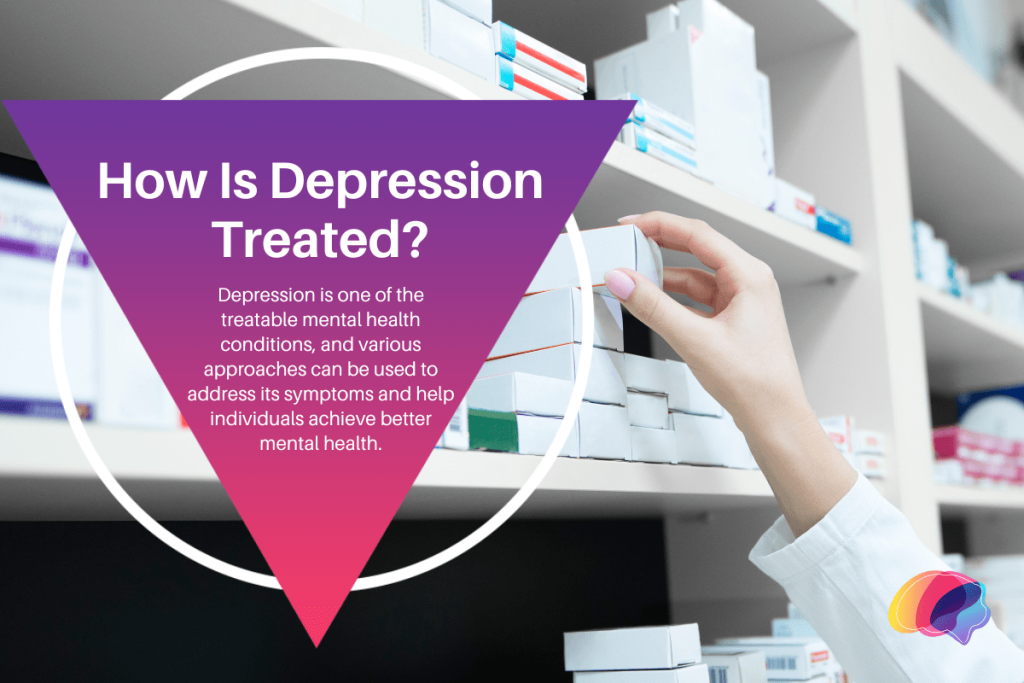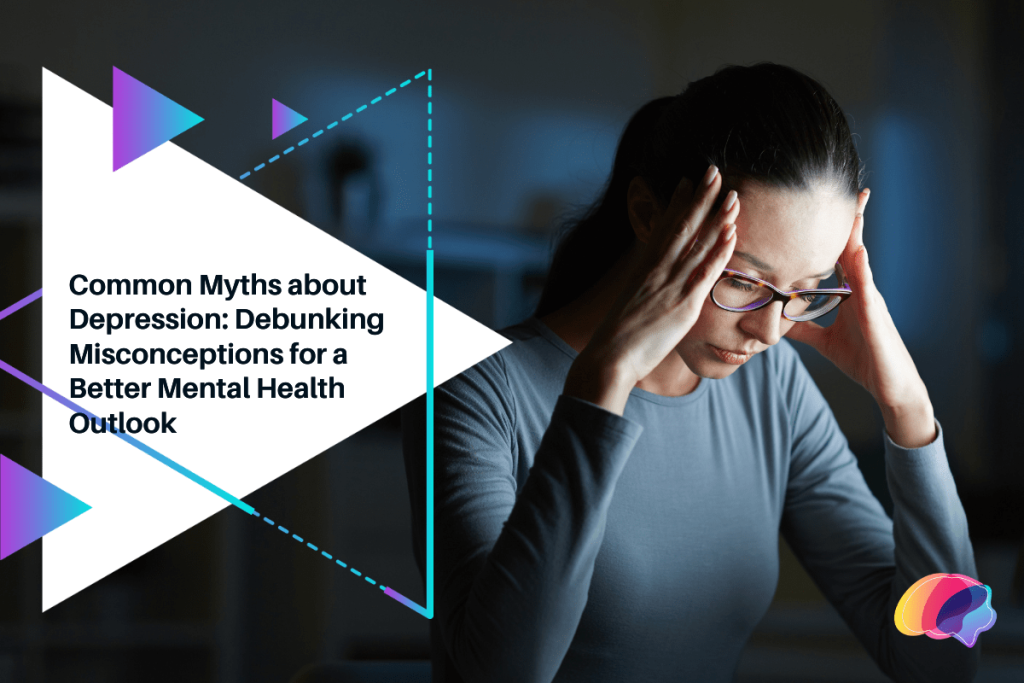Depression is a serious mental health condition affecting many people around the world. Despite its prevalence, there are many misconceptions surrounding depression that can lead to misunderstandings and hinder proper support for those who are struggling.
Let’s look into the facts about depression, debunk common myths, and provide a better understanding of this condition to ensure a healthier outlook on mental health.
What is Depression?

Depression is not just feeling sad for a short time. It is a common mental health condition characterized by persistent feelings of sadness, hopelessness, and a lack of interest or pleasure in activities. It falls under the category of mood disorders, with major depressive disorder (MDD) being the most prevalent form. MDD involves experiencing these symptoms for more than two weeks or longer, affecting one’s daily life, relationships, and overall well-being.
Signs and Symptoms of Depression
Understanding the different symptoms of depression can help identify the condition early and seek appropriate support. Some common indicators of depression include:
Persistent sadness or irritability– Feeling sad, empty, or hopeless most of the time and becoming easily irritable.
Loss of interest in activities– Losing enjoyment in hobbies, sports, or activities that once brought pleasure.
Changes in sleep patterns– Experiencing difficulties falling asleep, staying asleep, or sleeping excessively.
Fatigue and lack of energy– Feeling tired even after resting.
Changes in appetite or weight– Significant weight loss or gain due to changes in appetite.
Difficulty concentrating and making decisions– Struggling to focus, remember things, or make choices.
Physical symptoms– Experiencing unexplained aches, pains, or digestive problems.
Thoughts of self-harm or suicide– Having thoughts of hurting oneself or thinking that life is not worth living.
Experiencing one or two of these symptoms occasionally does not necessarily mean depression. However, if these symptoms persist for an extended period and interfere with daily life, seeking professional treatment is important.
Who Does Depression Affect?
Depression can affect anyone, regardless of age, race, or social status. It is not a sign of weakness or a character flaw but rather a complex interaction of genetic, biological, psychological, and environmental factors. Some common risk factors for depression include:
Family History– Family history plays a significant role in the risk of developing depression due to its genetic component. Having a family member with depression may increase the likelihood of experiencing it.
Traumatic Life Events– Going through significant life changes, such as the loss of a loved one, divorce, or financial problems, can trigger a depressive episode.
Chronic Illnesses– Certain medical conditions, like chronic pain, cancer, or heart disease, can contribute to depression.
Substance Abuse– Drug or alcohol abuse can worsen or trigger depression.
Hormonal Changes– Hormonal imbalances, such as during puberty, pregnancy, or menopause, can influence mood. Postpartum depression is one example.
Stress and Pressure– High levels of stress from work, school, or social pressures can contribute to depression.
Myths about Depression

While awareness about depression has grown over the years, several myths persist that hinder a comprehensive understanding of the illness. These myths contribute to stigmatization and may discourage individuals from seeking the help they need.
Myth #1: Depression Is Another Word For Sadness.
Fact: Depression and sadness are not the same things. While sadness is a normal emotion that everyone experiences from time to time, depression is a medical illness that goes beyond feeling down.
Sadness is usually a temporary response to specific events, like a loss or disappointment. On the other hand, depression is a persistent and pervasive feeling of sadness, hopelessness, and emptiness that lasts for an extended period, often disrupting daily life.
Myth #2: Depression Makes You Mentally Weak.
Fact: Depression has nothing to do with mental weakness or a lack of willpower. It is an illness that affects the brain’s chemistry and functioning. Just like any physical condition, depression requires proper treatment and support.
People with depression are not weak; they are dealing with a challenging and genuine health issue that requires understanding and empathy from others.
Myth #3: Depression Is The Result Of A Traumatic Event.
Fact: While some people may experience depression after a traumatic event, it is not the only cause. Depression is a complex condition with various contributing factors, including genetics, biological differences, and life circumstances.
Additionally, a chemical imbalance, such as serotonin, can contribute to the condition. Traumatic events can be a trigger for depression in some individuals, but they can also arise without any apparent external cause.
Myth #4: Depression Isn’t A Real Illness.
Fact: Depression is a very real and serious illness recognized by the medical community. It is classified as a mental health disorder in the Diagnostic and Statistical Manual of Mental Disorders (DSM-5), the standard reference mental health professionals use to diagnose conditions.
A depressed mood is not imaginary; it is a result of changes in brain chemistry and functioning.
Myth #5: Depression Is Only In The Head.
Fact: Depression may manifest as emotional and cognitive symptoms, but it also has physical manifestations. It is not just a matter of “thinking positive” or “snapping out of it.”
People with depression may experience physical symptoms such as unexplained aches and pains, changes in appetite or weight, and disruptions in sleep patterns. This shows that depression is not solely a mental issue but can affect the whole body.
Feeling down occasionally is a natural part of being human, but depression is not a normal part of life. It is a serious medical condition that requires treatment and intervention. If someone experiences persistent feelings of sadness, hopelessness, or loss of interest in daily activities, it is essential to seek professional help to determine if depression is present and to explore appropriate treatment options.
There are effective treatments available for major depression. Antidepressant medications can help balance brain chemicals and alleviate symptoms. Therapy, such as cognitive-behavioral therapy (CBT) or talk therapy, can provide valuable support in addressing negative thought patterns and coping with life’s challenges. In many cases, a combination of medication and therapy yields the best results.
How to Support Someone with Depression

Listen To Them Without Judgment
One of the most valuable things you can do for someone with clinical depression is to be a good listener. Allow them to express their feelings and thoughts without interruption or judgment. Show empathy and validate their emotions, letting them know that you are there for them and that they are not alone in their struggles.
Encourage Them To Seek Professional Help
While your support is helpful, remember that you are not a mental health professional. Encourage your loved one to reach out to a qualified therapist or counselor who can provide specialized help and guidance. Offer to assist them in finding a mental health professional and provide encouragement throughout the process.
Offer Practical Support, Such As Helping With Chores Or Cooking Meals

Depression can make even simple daily tasks feel overwhelming. Offer practical help by assisting with chores, running errands, or cooking meals. Small gestures like these can alleviate some of the burdens they may be experiencing and show them that you care.
Be Patient And Understanding
Recovery from depression takes time, and there may be ups and downs along the way. Be patient with your loved one and avoid pressuring them to “snap out of it” or “get over it.” Understand that depression is a mental illness, and healing may require persistence and ongoing support.
Educate Yourself About Depression
Take the time to educate yourself about depression and its effects. Understanding the condition can help you be more compassionate and better equipped to provide the right support. Learn about available treatments and coping strategies to offer helpful suggestions when needed.
Respect Their Boundaries
While it’s essential to be supportive, remember that everyone has their own way of dealing with depression. Respect their boundaries and avoid pushing them into activities or social situations they may not be ready for. Let them know that you are there for them whenever they feel comfortable reaching out.
Be a Positive Presence
Depression can be isolating, so be a positive presence in your loved one’s life. Engage in activities that they enjoy when they are ready and try to bring some joy and laughter into their day. Your positive energy can be uplifting and help them feel less alone in their struggle.
How Is Depression Treated?

Depression is one of the treatable mental health conditions, and various approaches can be used to address its symptoms and help individuals achieve better mental health. Here are some common methods for treating depression:
Medication
Antidepressant medications are often prescribed to treat depression. These drugs work by balancing certain chemicals in the brain, such as serotonin and norepinephrine, which are associated with mood regulation. There are different types of antidepressants, and the choice of medication depends on individual symptoms and medical history. It is essential to work closely with a healthcare professional to find the right medication and dosage that suits each person’s needs.
Therapy

Therapy, particularly psychotherapy or talk therapy, is a valuable depression treatment option. Trained therapists or counselors work with individuals to identify and address the underlying causes of depression, explore thought patterns, and develop coping strategies. Cognitive-behavioral therapy (CBT) is a common type of therapy used for depression, as it helps individuals recognize and modify negative thought patterns and behaviors.
Alternative Therapies
Some individuals may find relief from depression through alternative therapies. These approaches focus on holistic healing and may include practices such as yoga, meditation, mindfulness, and acupuncture. While alternative therapies may not replace traditional treatments, they can be complementary and may offer additional support to those with depression.
Lifestyle Changes

Making positive lifestyle changes can also play a significant role in managing depression. Regular exercise has been shown to have mood-enhancing effects and can be beneficial for those with depression. Engaging in activities that bring joy and relaxation, maintaining a balanced diet, and ensuring adequate sleep can contribute to improved mental well-being.
Support Networks
Building a strong support network is important for individuals experiencing symptoms of depression. Recognize that not everyone with depression may require medication, but everyone benefits from support. A strong network can include family, friends, therapists, or support groups. Family and friends who understand and provide encouragement can offer emotional support throughout the treatment process. Joining support groups or seeking community-based programs can also connect individuals, including older adults, with others who share similar experiences, reducing feelings of isolation.
Transcranial Magnetic Stimulation (TMS)
For severe or treatment-resistant depression, healthcare professionals may consider more specialized treatments such as transcranial magnetic stimulation (TMS). TMS uses magnetic fields to stimulate nerve cells in the brain. These therapies are typically considered when other treatments have not been effective.
It is important to note that a major depressive episode varies from person to person, and there is no one-size-fits-all approach to treatment. Some individuals may benefit from a combination of therapies, while others may find relief with a specific method. Seeking help from qualified healthcare professionals and mental health experts is vital in determining the most effective treatment plan for each individual’s unique needs. With the right support and treatment, many people with depression can experience significant improvement in their symptoms and overall quality of life.
Start Your Healing Journey Now at Lucid Wellness Center
Experience the potential of TMS Therapy at Lucid Wellness Center. Our evidence-based, non-invasive approach offers hope for treatment-resistant depression. Backed by scientific research, our expert clinicians provide personalized care to optimize your results. Take charge of your mental health journey today. Schedule a free initial consultation with our board-certified psychiatrist and explore the possibilities of TMS Therapy for lasting relief from depression.
Frequently Asked Questions on Myths about Depression
What Gender Is More Likely To Be Depressed?
According to research, major depression is more common in women than in men, with global annual prevalence rates of 5.5% in women and 3.2% in men. A woman’s likelihood of experiencing depression can be influenced by various factors, such as premenstrual difficulties, the process of pregnancy and giving birth, menopause, and changes in hormone levels.
What Is The Most Depressed Age?
Based on the 2019 data from Centers for Disease Control and Prevention, the age group most affected by depression is 18 to 29 years old, with 21% of adults in this category experiencing any depressive symptoms.
Is Depression Curable Or Just Treatable?
Depression is treatable but may not be entirely curable for everyone. Treatment options such as therapy and medication can effectively manage symptoms and improve a person’s quality of life. However, the outcome varies depending on individual factors, including the severity of depression, underlying psychological factors, and the presence of support from family members or a supportive environment. If left untreated, depression can have serious consequences on one’s mental and physical health, underscoring the importance of seeking help and timely intervention.
Can Depression Cause Retardation?
Depression may lead to cognitive impairment, impacting a person’s cognitive abilities, such as thinking, concentration, memory, and decision-making. However, it is important to note that cognitive impairment is different from mental retardation, which is a developmental disability characterized by substantial limitations in intellectual functioning and adaptive behavior.
What Are The Negative Views Of People With Depression?
People with depression may encounter negative views due to misunderstandings surrounding the condition. Some hold misconceptions about depression being a result of personal weakness rather than acknowledging its biological factors. Others may expect individuals to “snap out of it” and feel sad, dismissing the complexity of the illness. Stereotypes may suggest that depression can be overcome solely with coping skills, undermining the need for professional treatment. Additionally, many myths perpetuate stigma, hindering open conversations about mental health and access to support.
These negative views can lead to stigmatization and isolation and hinder individuals from seeking help or talking openly about their struggles. It is essential to challenge these misconceptions and promote empathy, understanding, and support for people who develop depression. Educating society about mental health, advocating for mental health awareness, and providing a safe and non-judgmental environment for those with depression can help reduce stigma and foster a more compassionate society.

